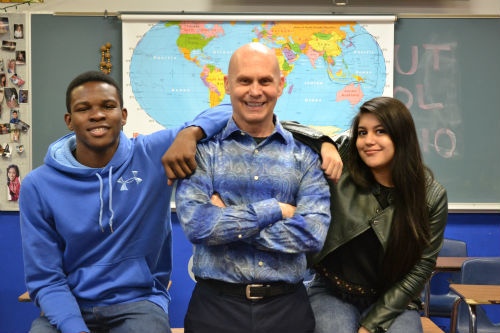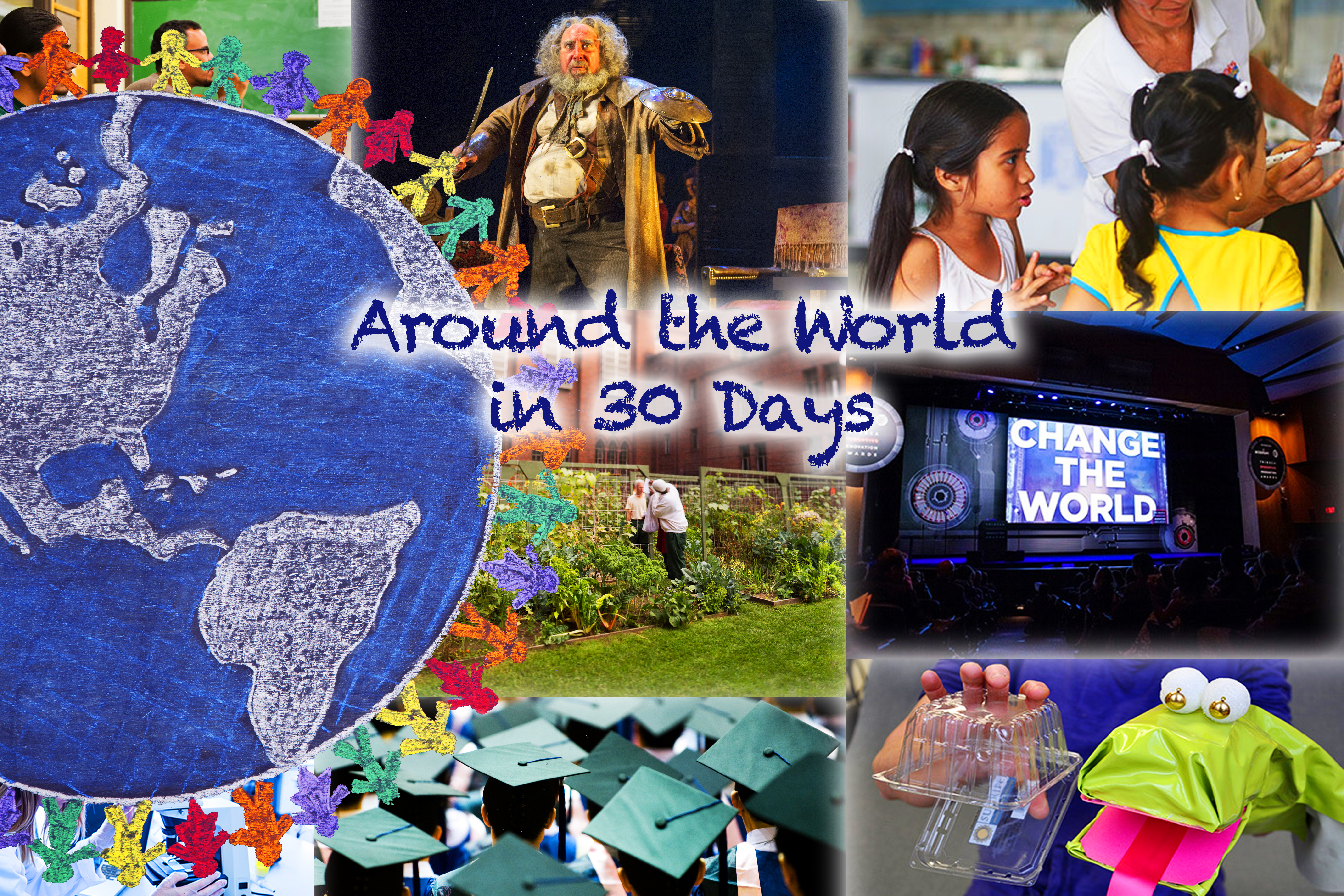
Diesen Monat, Ich setzte meine Gespräche mit Führungskräften aus der ganzen Welt über die dringendsten Fragen der Bildung von heute fort – von den Herausforderungen bei der Jobsuche bis hin zur psychischen Belastung durch Mobbing, von den Friedensprotesten der japanischen akademischen Gemeinschaft bis hin zum Engagement des International Baccalaureate für Multikulturalismus. Mittlerweile, vor Ort in New York, I learned how BAM (Brooklyn Academy of Music) and other Arts organizations are helping to complete the comprehensive Cultural Plan for New York City, which aspires to bring arts education to every school in the city. BAM is using new technology to bring their work into classrooms worldwide, making their platform accessible to young audiences and students anywhere at any time.
Die globale Suche nach Education core mission is to promote sustainable change through global discourse, and so I couldn’t be happier than to talk with George Rupp (former President of Rice University, Columbia University, und das International Rescue Committee) about his new endeavor as Chair of the International Baccalaureate’s Board of Governors. This program, offered in 146 Länder, is among our favorites as it gives students the perspectives of other cultures, societies and countries through its rigorous criteria for graduation: Schüler müssen sechs interdisziplinäre Kurse, Schreiben einer Hausarbeit, und vollständige Zivildienst.
In Rupp’s new position, I learned that he’s working towards fostering multicultural competence and building more relations with underrepresented regions of the world. His goals are ones that all institutions should aim for. As he says, “Bildung, die wissenschaftlich strengen ist, bewusst multikulturellen, and concerned with developing personal values that include a commitment to community service, is an invaluable resource for any and all of us.”
I received many emails in the past few months from scholars appealing Japan’s attempt to lift the constitutional ban on collective self-defense (CSD). If CSD is lifted, this could reignite participation in war for a country that has had its fill of battle. As I looked more into it, I was happy to support this cause, which grew to include over 9000 Wissenschaftler. I talked to Dr. Manabu Sato (Professor Emeritus, University of Tokyo), who co-led the initiative called Association of Scholars Opposed to the Security Related Bills. Sato calls the bill “not simply unconstitutional but also an attack on the key principles of constitutionalism and the rule of law,” adding that we also need to “challenge the hypocrisy exhibited by many Western governments, einschließlich der US, dass in der Regel begrüßen den Versuch der Abe-Regierung, das Verbot der CSD heben, under the name of ‘pro-active contribution to peace’ through which Japan plays a bigger role in defending the ‘rule of law’ im Rahmen der maritimen und territorialen Konflikte in Asien.”
Im Juli, I asked our global teacher bloggers about a pertinent and poignant issue: Mobbing. DR. Tracey C. Burns, a Project Leader at the OECD in Paris and a global expert on bullying, confirms that “a huge amount of political attention is being paid to the issue.” Statistics repeatedly show the prevalence of bullying in American schools, and new research suggests that social media has brought school bullying into the home. Many bold recommendations were offered from teachers, all of whom brought their personal experience to tackling this difficult issue. Guest blogger James Alan Sturtevant recommended reaching out to bullies – Feststellung, dass “harsh consequences don’t always work, can make bullies worse, and sometimes evoke retribution for unfortunate victims.” And Pauline Hawkins cautioned that anti-bullying programs in schools will have little influence on students if the adults in their lives are not teaching and modeling respect.” We also heard from Australian expert Lisa Currie (Schöpfer des Ripple Kindness-Projekt), who recommended the practice of fostering kindness in schools and offered many real world examples of how to do this.
While many think of New York and California as the go-to places for post-college jobs, a recent report has shown that actually Massachusetts, Delaware, und Washington haben die meisten Stellenangebote per Hochschulabsolvent. Ich got to talk this month with Anthony P. Karneval, the report’s lead author and the director of Georgetown University’s Center on Education and the Workforce. For parents and students anxious about the meagerness of today’s job market, Carnevale has given a report, which as he says, hat “the ability to connect real people with real jobs in real time.” His report has remarkable findings that will be a boon to anyone who wants to know about the reality of post-college life. One of many insights this report provides is that “Software-Entwickler, Krankenschwestern, and managers are among the most in-demand professionals in every state.”


Begleiten Sie mich und weltweit renommierten Vordenkern wie Sir Michael Barber (Vereinigtes Königreich), DR. Michael Block (US-), DR. Leon Botstein (US-), Professor Ton Christensen (US-), DR. Linda Hammond-Liebling (US-), DR. MadhavChavan (Indien), Professor Michael Fullan (Kanada), Professor Howard Gardner (US-), Professor Andy Hargreaves (US-), Professor Yvonne Hellman (Niederlande), Professor Kristin Helstad (Norwegen), Jean Hendrickson (US-), Professor Rose Hipkins (Neuseeland), Professor Cornelia Hoogland (Kanada), Herr Jeff Johnson (Kanada), Frau. Chantal Kaufmann (Belgien), DR. EijaKauppinen (Finnland), Staatssekretär TapioKosunen (Finnland), Professor Dominique Lafontaine (Belgien), Professor Hugh Lauder (Vereinigtes Königreich), Herr Ken Macdonald (Vereinigtes Königreich), Professor Geoff Masters (Australien), Professor Barry McGaw (Australien), Shiv Nadar (Indien), Professor R. Natarajan (Indien), DR. PAK NG (Singapur), DR. Denise Papst (US), Sridhar Rajagopalan (Indien), DR. Diane Ravitch (US-), Richard Wilson Riley (US-), Sir Ken Robinson (Vereinigtes Königreich), Professor Pasi Sahlberg (Finnland), Professor Manabu Sato (Japan), Andreas Schleicher (PISA, OECD), DR. Anthony Seldon (Vereinigtes Königreich), DR. David Shaffer (US-), DR. Kirsten Sivesind (Norwegen), Kanzler Stephen Spahn (US-), Yves Theze (LyceeFrancais US-), Professor Charles Ungerleider (Kanada), Professor Tony Wagner (US-), Sir David Watson (Vereinigtes Königreich), Professor Dylan Wiliam (Vereinigtes Königreich), DR. Mark Wormald (Vereinigtes Königreich), Professor Theo Wubbels (Niederlande), Professor Michael Young (Vereinigtes Königreich), und Professor Zhang Minxuan (China) wie sie das große Bild Bildung Fragen, die alle Nationen heute konfrontiert erkunden.
Die Global Search for Education Community-Seite
C. M. Rubin ist der Autor von zwei weit Lese Online-Serie für den sie eine 2011 Upton Sinclair Auszeichnung, “Die globale Suche nach Bildung” und “Wie werden wir gelesen?” Sie ist auch der Autor von drei Bestseller-Bücher, Inklusive The Real Alice im Wunderland, ist der Herausgeber des CMRubinWorld, und ist ein Disruptor Foundation Fellow.
Folgen Sie C. M. Rubin auf Twitter: www.twitter.com/@cmrubinworld





Jüngste Kommentare